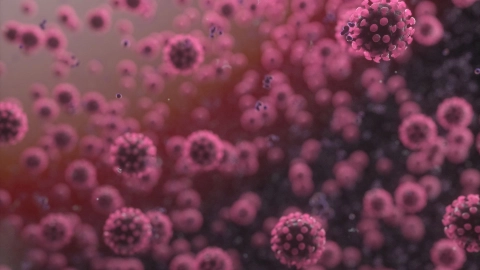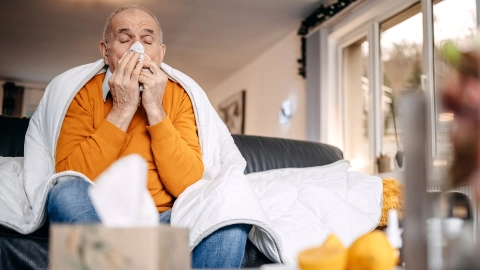Conditions COVID-19 (coronavirus disease 2019)
ICD codes: U07.1 U07.2 What are ICD codes?
COVID-19 is caused by the SARS-CoV-2 coronavirus. The disease commonly produces respiratory symptoms. Both mild and severe forms are possible, as are long-term consequences. People can get vaccinated against COVID-19. Various types of medication are also available to treat the illness.
At a glance
- COVID-19 is an infectious disease caused by the SARS-CoV-2 coronavirus.
- The typical symptoms are a cough, rhinitis (sneezing, itchiness and a blocked or runny nose), headache, sore throat and limb pain. A high temperature is more likely to occur with COVID-19 than with a cold.
- Most people with COVID-19 have mild to moderate symptoms and are able to recover at home. Older people and people with pre-existing conditions are particularly at risk of developing a severe form of the disease.
- An infection with COVID-19 may have long-term consequences. This is known as long COVID.
- Vaccination offers effective prevention against becoming seriously ill with an infection. There are also various types of medication to alleviate symptoms.
- Certain hygiene and other precautionary measure help reduce the risk of infection.
Note: The information in this article cannot and should not replace a medical consultation and must not be used for self-diagnosis or treatment.

What is COVID-19?
COVID-19 disease is caused by an infection with the SARS-CoV‑2 coronavirus. As its name indicates, it is related to the pathogen that causes severe acute respiratory syndrome (SARS).
Some people who become infected with COVID-19 do not develop any symptoms. Most people have a mild or moderate form of the disease. However, some people become so ill that they have to be hospitalized or may even die as a result. The cause of death is usually lung or multiple organ failure.
Older people and people with pre-existing conditions are particularly at risk of becoming seriously ill with COVID-19. However, severe COVID-19 infections are also possible in young and otherwise healthy people.
Vaccination against COVID-19 help prevent serious illness and death.
Video What are infectious diseases?
The video below looks at when doctors talk about an infectious disease, which pathogens trigger infectious diseases, and how they are transmitted.
This and other videos can also be found on YouTube
Watch nowThe privacy policy indicated there applies.
What are the symptoms of COVID-19?
With COVID-19, the first symptoms appear on average around 3 to 4 days following infection. However, symptoms may also occur somewhat sooner or later than this.
Common symptoms are:
- coughing
- rhinitis (sneezing, itchiness and a blocked or runny nose)
- sore throat
- headache and limb pain
High temperatures occur more commonly with COVID-19 than with a cold. Other possible symptoms are:
- shortness of breath that can reach the point of respiratory distress (difficulty breathing)
- abdominal pain
- nausea, vomiting
- diarrhea
- loss of appetite
- skin rash, conjunctivitis
- swollen lymph nodes
- sleepiness
- lost or changed sense of smell and taste
What should people do if they have symptoms?
Stay at home until the symptoms have significantly improved. Avoid contact with others, especially people in high-risk groups. Follow general hygiene rules to avoid infecting others. Ask your family doctor for advice about what to do next. Outside of consulting hours, you can contact the non-emergency medical assistance service by phoning 116117.
How long do people with COVID-19 remain infectious?
People infected with SARS-CoV-2 can transmit the virus to others 1 to 2 days before they experience any symptoms. The risk is greatest around the onset of symptoms.
How long someone stays infectious depends on the form the disease takes. Most people are no longer infectious after 10 days. However, it is also possible to remain infectious for much longer, in particular if the infection has been severe or if the immune system is weakened.

How do people become infected with COVID-19?
The SARS-CoV-2 is largely spread by means of droplets containing the virus. Depending on the size and properties of these droplets, they are classified as either aerosols, which are tiny microdroplets suspended in the air, or larger droplets.
Aerosols are created by people when they breathe or speak, but particularly when they shout loudly, sing or engage in sports activities. A significantly greater number of larger droplets are produced when people cough and sneeze.
While larger droplets sink to the ground faster, aerosols may remain suspended in the air for longer periods and spread within enclosed spaces.
If droplets containing the virus come into contact with the mucous membranes in other peoples’ noses, mouths or eyes, they may become infected with the virus. The virus may also be transferred to the mucous membranes if the droplets land on other people’s hands and they then touch their face (this is known as “smear infection”, i.e., infection by touch).
Important: SARS-CoV-2 is capable of changing its properties. By now, there are several variants in existence that spread faster and are more transmissible than the original virus.
How dangerous are the virus variants?
In general, infections with the Omicron virus variant tend to be less severe than infections with earlier variants. One reason for this is that most people have now acquired a basic immunity to the virus as a result of vaccination or infection.
Which factors increase the likelihood of developing a severe form of COVID-19?
The likelihood of becoming very ill with COVID-19 increases from the age of 50 to 60 and upwards.
Certain underlying illnesses also increase the risk of developing a severe case of COVID. These include, for example:
- congenital or acquired immunodeficiency
- active cancer
- chronic kidney diseases, particularly in people on dialysis
- chronic liver diseases
- diabetes mellitus
- cardiovascular diseases such as high blood pressure and narrowing of the coronary arteries
- chronic lung diseases such as COPD
- neurological and psychiatric disorders such as dementia
People who are obese and with Down’s syndrome are also more likely to develop a severe form of COVID‑19.
In addition, certain medications that weaken the immune system increase the risk of developing a severe case of the illness. Examples include immunosuppressants, systemic cortisone treatments, and chemotherapy drugs.
How does COVID-19 progress?
The progression of COVID-19 differs between individuals, depending on how effective the body’s immune system is against the virus.
Most people who are infected don’t become seriously ill and recover within a period of one to two weeks. The symptoms get worse in some people, often from the second week of the illness.
Another possible complication is pneumonia. This can prevent a sufficient amount of oxygen from entering the bloodstream. Most people with COVID-19 who develop pneumonia require treatment in hospital, in some cases in an intensive care unit.
In rare cases, the disease is fatal. This is more common among older people – most of those who have died as a result of a COVID-19 infection were over 70 years of age.
What complications can occur with COVID-19?
Complications can occur if COVID-19 causes a person to develop pneumonia, for example. In addition, inflammatory processes in the body can lead to excessive blood clotting. If increasing numbers of blood clots begin to form, this increases the risk of blood vessels becoming blocked. This, in turn, can result in pulmonary embolism or a stroke.
If the immune system overreacts to infection, the body may have a severe inflammatory response. This can damage the lungs and cause severe respiratory problems. The inflammation can also spread to organs such as the heart, nervous system or kidneys.
A strong inflammatory response can potentially cause individual organs to fail. The affected organs then require mechanical support in order to continue functioning. If several organs fail at the same time, this is a life-threatening situation.
A secondary bacterial or fungal infection may also occur with COVID-19. These are referred to by medical professionals as superinfections.
What are the long-term effects of COVID-19?
People who become ill with COVID-19 may continue to have health problems for weeks or even months after the acute infection has resolved. If symptoms persist for more than four weeks or if new symptoms develop at that stage, this is known as long COVID. However, this only applies if there is no other explanation for the symptoms. If people continue to experience symptoms for more than 12 weeks following infection, experts refer to this as “post-COVID condition” or “post-COVID syndrome”.
The most common symptoms include fatigue, loss of stamina, shortness of breath and concentration and memory deficits, also known as “brain fog”.
The risk of long-term health problems is greater when the COVID-19 infection is severe. But long-term consequences are also possible even when the illness is mild or moderate.
Detailed information about the long-term effects of an infection with SARS-CoV-2 is provided in the article on Long COVID.
How can COVID-19 be prevented?
Various measures can be taken to reduce the risk of infection. COVID-19 vaccination offers protection against a severe COVID-19 infection.
COVID-19 vaccination
Several COVID-19 vaccines are available in Germany, which are safe and effective. Vaccines continue to be developed on an ongoing basis in order to ensure protection against newer virus variants. These adapted (i.e., updated) vaccines are also available. They are used in particular for booster vaccinations.
The number of vaccinations recommended depends on:
- the individual’s age and health status
- how many vaccinations they have previously received
- whether and when the individual has been infected with COVID-19
Visit infektionsschutz.de for detailed information about COVID-19 vaccination, including the current vaccination recommendations and the various vaccines available.
The “Corona-Impfcheck” online vaccination checker tool developed by the Federal Center for Health Education (Bundeszentrale für gesundheitliche Aufklärung, BZgA) allows you to check whether vaccination is currently recommended for you.
The website of the Robert Koch Institute (RKI) provides answers to frequently asked questions about COVID-19 and vaccinations.
For more information about COVID-19 vaccines, for example, about their development and the approval process, visit the website of the Paul Ehrlich Institute (PEI).
What else can I do to protect myself?
- Ventilate regularly – ensuring an adequate supply of fresh air in indoor spaces is an effective way to remove aerosols. Creating a cross-draft between two open windows is the most effective type of ventilation.
- Wear a mask – it may be useful to wear a medical face mask covering the mouth and nose to protect yourself at times of increased respiratory infections.
How can I protect others?
- Maintain good hygiene – wash your hands regularly with soap. Sneeze or cough into a tissue or into the crook of your elbow.
- Wear a mask – if you are ill but unable to stay at home, you can reduce the risk of infecting others by masking your mouth and nose.
- Test yourself – in certain situations, it may be useful to test yourself for COVID-19, for example, if you are planning to have contact with people who are in at-risk groups. If the test is positive, postpone the contact if possible.
Note: If you have acute respiratory symptoms, you should stay at home. Avoid unnecessary contact with others until the symptoms have significantly improved.
How is COVID-19 diagnosed?
A COVID-19 infection has similar symptoms to the flu. However, the infection may also be mild and more similar to a cold. This means that the disease cannot be diagnosed on the basis of symptoms alone.
To detect the SARS-CoV-2 pathogen, a swab is taken from the back of the nose and throat. Trained personnel can detect an infection directly using a rapid antigen test. These rapid tests offer the advantage of delivering a result within a period of 15 to 30 minutes. The drawback is that the result is less reliable than the result of a PCR test. A PCR test examines the virus’s genetic material. The result is usually available within 24 hours.
Anyone who has a positive rapid test result should have it confirmed with a PCR test. A negative rapid test does not definitively exclude an infection with SARS-CoV-2. If there is any doubt, a PCR test should be performed if COVID is suspected. The same applies to the rapid self tests that can be purchased without a prescription and administered at home.
For detailed information about the various types of COVID-19 tests available, see infektionsschutz.de.
On the same site, the Federal Center for Health Education (Bundeszentrale für gesundheitliche Aufklärung, BZgA) provides answers to frequently asked questions about COVID testing.
How is COVID-19 treated?
People can recover at home from a mild case of COVID-19. It is important to take plenty of rest and ensure a sufficient intake of fluids. Medication such as paracetamol or ibuprofen help if the person is suffering from headache or achy limbs.
Which types of medication alleviate the symptoms of COVID-19?
Doctors can prescribe special medication as soon as possible following infection for people who are at risk of developing a severe illness. These antiviral medications are intended to prevent the virus from replicating in the body. Examples include:
- nirmatrelvir/ritonavir (Paxlovid)
- remdesivir (Veklury)
Which anti-viral drug is used depends for example on individual factors, such as:
- whether the patient has other underlying conditions
- whether the patient is taking any long-term medication
- whether there are any possible contraindications
Important: To benefit from anti-viral treatment, the drug must be taken as soon as possible after symptoms are first noticed or after the point in time at which it is suspected the person became infected.
What other therapies are available?
Some people who develop pneumonia as a result of COVID-19 require oxygen or ventilation. They are usually also treated with anti-inflammatory medication, primarily cortisone treatment. In some cases, they are given medication that acts on the immune system. One important measure in treating a COVID-19 patient who is being ventilated is to lie them on their stomach.
If older people or those with a pre-existing health condition are at an increased risk of developing a severe infection and are not very mobile, they may be treated with anticoagulants such as heparin to prevent clotting. Anti-clotting medication is usually also administered to patients who contract a COVID-19 infection in hospital. Further treatment depends on the possible complications that may occur. If the patient develops a secondary bacterial infection, for example, they are given antibiotics.
How does ventilation work?
To stimulate the patient’s breathing, doctors first administer oxygen. This can be done via a nasal cannula or a respiratory mask, for example.
If this fails to ensure that sufficient oxygen is reaching the bloodstream, artificial ventilation is necessary. For this purpose, doctors insert a breathing tube into the windpipe under anesthetic.
In very severe cases, ECMO (commonly known as artificial lungs) may be used. It involves pumping the blood out of the body, adding oxygen to it and then pumping it back into the body.
Where can I find more information about COVID-19?
Detailed information about SARS-CoV-2 and COVID-19 is available on the website of the Robert Koch Institute (RKI).
On the same site, the RKI also provides answers to frequently asked questions about COVID-19 and COVID-19 vaccinations.
Information about COVID-19 is provided by infektionsschutz.de – a website operated by the Federal Center for Health Education (Bundeszentrale für gesundheitliche Aufklärung, BZgA).
The BZgA’s “Corona-Impfcheck” online vaccination checker tool allows you to check your current level of protection against COVID-19.
The Standing Committee on Vaccination (Ständige Impfkommission, STIKO) comprises various experts who develop recommendations on vaccinations in Germany. These recommendations are updated and published regularly. STIKO has also published its latest recommendations for vaccination against COVID-19.
The Federal Ministry of Health (Bundesministerium für Gesundheit, BMG) has information about various topics relating to the COVID-19 pandemic on its website. There you will find useful links and information about past measures relating to COVID-19.
- Deutsche Gesellschaft für Internistische Intensivmedizin und Notfallmedizin e.V. (DGIIN), Deutsche Interdisziplinäre Vereinigung für Intensiv- und Notfallmedizin e.V. (DIVI), Deutsche Gesellschaft für Pneumologie und Beatmungsmedizin e.V. (DGP), Deutsche Gesellschaft für Infektiologie e.V. (DGI). Empfehlungen zur Therapie von Patienten mit COVID-19. S3-Leitlinie. AWMF-Registernummer 113/001. 02/2025.
- Institut für Qualität und Wirtschaftlichkeit im Gesundheitswesen (IQWiG). gesundheitsinformation.de. Covid-19 (Coronavirus-Krankheit). Aufgerufen am 20.10.2023
- Robert Koch-Institut (RKI). Antworten auf häufig gestellte Fragen (FAQ) zu akuten Atemwegserkrankungen und COVID-19. Stand: 04.10.2023. Aufgerufen am 20.10.2023.
- Robert Koch-Institut (RKI). COVID-19 und Impfen: Antworten auf häufig gestellte Fragen (FAQ). Stand 27.10.2023. Aufgerufen am 15.11.2023.
- Robert Koch-Institut (RKI). Epidemiologischer Steckbrief zu SARS-CoV-2 und COVID-19. Stand 26.11.2021. Aufgerufen am 20.10.2023.
- Robert Koch-Institut (RKI). Fachgruppe COVRIIN. Hinweise zu Therapie und Versorgung. Stand 02.06.2023. Aufgerufen am 20.10.2023.
- Robert Koch-Institut (RKI). SARS-CoV-2: Virologische Basisdaten sowie Virusvarianten im Zeitraum von 2020-2022. Stand 21.09.2023. Aufgerufen am 20.10.2023.
- Ständiger Arbeitskreis der Kompetenz- und Behandlungszentren für Krankheiten durch hochpathogene Erreger am Robert Koch-Institut (STABKO). Hinweise zu Erkennung, Diagnostik und Therapie von Patienten mit COVID-19. Stand 08.02.2023. Aufgerufen am 20.10.2023.
- Umweltbundesamt. Stellungnahme der Kommission Innenraumlufthygiene. Das Risiko einer Übertragung von SARS-CoV-2 in Innenräumen lässt sich durch geeignete Lüftungsmaßnahmen reduzieren.
In cooperation with the Robert Koch Institute (RKI).
As at:








